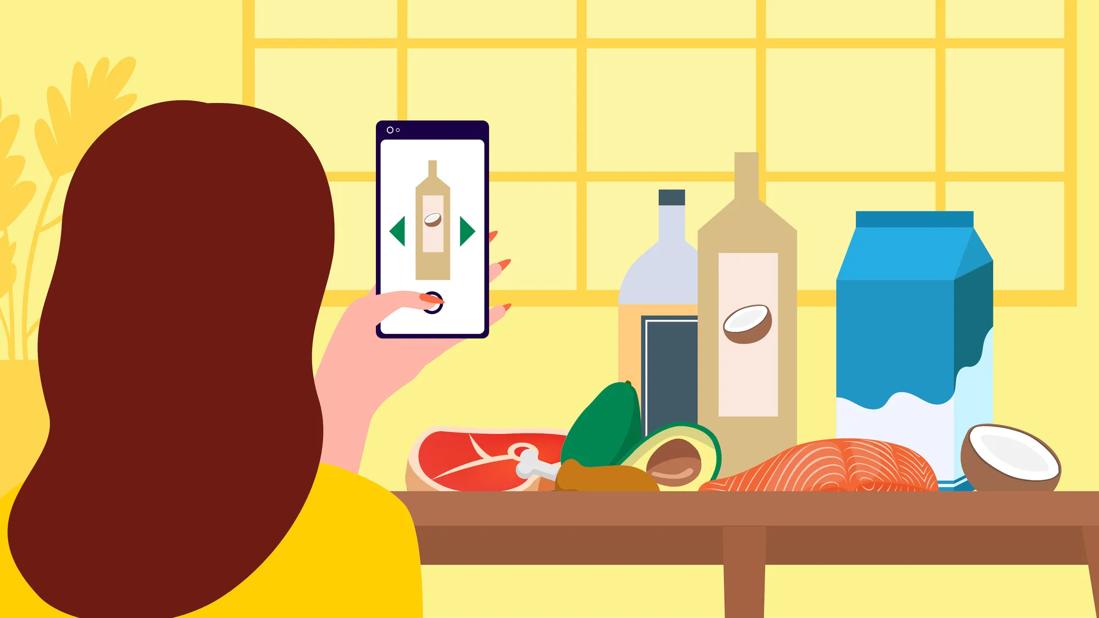Your body needs some saturated fat, but too much can contribute to health issues

Image content: This image is available to view online.
View image online (https://assets.clevelandclinic.org/transform/d254b171-7b90-481f-9ef1-6eddf0318130/saturated-fats-1387157236)
Person looking at phone for saturated fat food items that are also on the kitchen table.
Saturated fat carries a bad reputation when it comes to the food we eat. It’s often talked about as a nutritional boogeyman that carries health dangers.
Advertisement
Cleveland Clinic is a non-profit academic medical center. Advertising on our site helps support our mission. We do not endorse non-Cleveland Clinic products or services. Policy
But are saturated fats really that bad? And should you try to avoid them entirely? We asked registered dietitian Katherine Patton, MEd, RD, LD, to explain whether they fit into a healthy diet.
Saturated fat is a dietary fat that’s naturally found in many of the foods we eat. (More on that in a moment.) At room temperature, saturated fat tends to congeal and turn into a solid mass, says Patton.
Scientifically speaking, saturated fat is a chemical compound built with a chain of carbon and hydrogen atoms. Each carbon atom is bonded to the maximum number of hydrogen atoms. Hence, the “saturated” name.
Saturated fat is abundant in many animal-based foods, like various types of meat and animal-based products that occupy our plates. But saturated fat can also be high in certain plant-based products. (Surprise!)
The wide-ranging list of foods high in saturated fats includes:
Advertisement
When it comes to whether saturated fat is good or bad, what seems clear from many studies is that it’s a question of quantity. A diet high in saturated fat can bring a variety of health concerns, including:
“If you aren’t reading nutrition facts labels to assess saturated fat intake, you should start,” advises Patton. “Limiting your intake of saturated fat could help reduce these chronic diseases from occurring or prevent the need for medications.”
Absolutely! Because, despite what you just read above, it’s not all bad news when it comes to saturated fat, explains Patton. A little saturated fat in your diet can help:
But the key is eating food with saturated fat in moderation.
The American Heart Association recommends getting less than 6% of your daily calories from saturated fat. In a 2,000-calorie-a-day diet, that means 120 calories or less from saturated fat. That equals 13 grams of saturated fat, if you’re checking nutrition labels.
The U.S. federal government’s Dietary Guidelines for Americans sets the saturated fat target at no more than 10% of your daily calories. That works out to 200 calories or about 20 grams of saturated fat per day in a 2,000-calorie diet.
“We do not recommend completely avoiding saturated fat,” says Patton. “It’s about finding a healthy balance.”
It’s also about choosing nutritious foods that happen to include saturated fat.
“Natural sources of saturated fat like lean beef and low-fat dairy come with vitamins and nutrients that your body needs,” she emphasizes. “You’re not getting that same nutritional return eating fried cheese sticks.”
Advertisement
While saturated fat is often vilified, it can be part of a healthy diet if it’s a small part of that diet. Of course, that’s the difficult part. It’s estimated that 3 out of 4 people exceed recommendations when it comes to eating saturated fat.
To lower saturated fat consumption, Patton suggests:
Filling your plate with more fruits, vegetables and whole grains may help fill your belly and limit saturated fat in your meal. Also, consider adding more plant-based protein sources, like beans, lentils and nuts.
Be wary of processed foods marketed as “low-fat” or “fat-free,” too. These products often include additional sugar to improve taste, which can boost the calorie count.
“I would recommend keeping your pantry and fridge stocked with your healthy go-tos for daily eating,” Patton advises. “Try to save your more saturated fat-rich foods for weekends, holidays and special occasions.”
Advertisement

Sign up for our Health Essentials emails for expert guidance on nutrition, fitness, sleep, skin care and more.
Learn more about our editorial process.
Advertisement
Olive oil is high in heart-friendly unsaturated fats
It’s best to avoid regular use of the ‘beef drippings,’ given high levels of saturated fat
These common cooking oils are often found in ultra-processed foods and can contribute to inflammation in your body
This healthy oil is packed with nutrients and great for roasting, drizzling and even baking
The popular cooking method can help you cut down on fat without losing the flavor and texture of your favorite foods
EVOO is full of antioxidants and has anti-inflammatory properties, both of which aid your body in multiple ways
The oil some TikTokkers swear by can actually cause stomach and eye issues, as well as skin rashes
This powerhouse oil fights fine lines and wrinkles, soothes sunburn and a whole lot more
Although it could be used as a moisturizer, this new trend is not recommended
Communicating clear limits helps protect your time, energy and emotional well-being
High cholesterol can be genetic, but testing and treatment can lower your heart disease risk